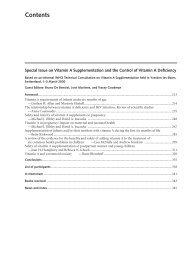Implementing food-based dietary guidelines for - United Nations ...
Implementing food-based dietary guidelines for - United Nations ...
Implementing food-based dietary guidelines for - United Nations ...
You also want an ePaper? Increase the reach of your titles
YUMPU automatically turns print PDFs into web optimized ePapers that Google loves.
Diet- and host-related factors in nutrient bioavailability<br />
or household levels; they are summarized in table 3 and<br />
discussed in turn below. When a combination of strategies<br />
is used, such as soaking, germination, and fermentation,<br />
phytate can be almost completely removed. This<br />
is important, because phytic acid is a potent inhibitor<br />
of iron absorption at low concentrations [38]. During<br />
commercial <strong>food</strong> processing, the use of certain <strong>food</strong><br />
additives, as well as some inadvertent or intentional<br />
contaminants, may also influence the bioavailability<br />
of some nutrients.<br />
Thermal processing<br />
Thermal processing generally enhances the digestibility<br />
of proteins and carbohydrates and may improve<br />
the bioavailability of iodine and certain vitamins (e.g.,<br />
niacin, thiamin, vitamin B 6 , and some carotenoids)<br />
(table 3). In some cases, these improvements in nutrient<br />
bioavailability arise because of the destruction of<br />
some heat-labile antinutrients summarized in table 4.<br />
The digestibility of protein, <strong>for</strong> example, is enhanced<br />
by the destruction of protease inhibitors found in many<br />
legumes, grains, and other <strong>food</strong>s. Protease inhibitors<br />
block the activity of pancreatic enzymes such as trypsin<br />
and chymotrypsin but are destroyed during roasting<br />
and toasting, although boiling may not fully deactivate<br />
them. Similarly, the harmful effects of lectins (agglutinins)<br />
found in certain legumes, including soybeans and<br />
peanuts, can also be removed by heat treatment. Lectins<br />
can agglutinate red blood cells, and they also have the<br />
capacity to adhere to glycoproteins of the intestinal<br />
mucosal membrane surface, leading to a decrease in<br />
digestive and absorptive capacity as well as symptoms<br />
of nausea and diarrhea [108].<br />
Goitrogens can also be inactivated by thermal<br />
processing. The major goitrogens in plant <strong>food</strong>s are<br />
sulfur-containing glucosides (glucosinolates) which<br />
can block the absorption or utilization of iodine, and<br />
thus its uptake into the thyroid gland. More details are<br />
given by Gaitan [109]. Their action is especially important<br />
when iodine intake is low [110]. Neonates, and to<br />
a lesser extent pregnant women, are more sensitive to<br />
S85<br />
the antithyroid action of <strong>dietary</strong> goitrogens than are<br />
infants and children.<br />
Reports on the effects of thermal processing on<br />
phytate degradation are inconsistent and depend on<br />
the plant species, temperature, and/or pH. Thermal<br />
processing involving high temperatures, such as those<br />
used in canning, has been reported to reduce the<br />
phytate content of beans by 70% to 91% [111]. An in<br />
vivo study by Hurrell and co-workers [112], however,<br />
concluded that the extent of phytate degradation in<br />
industrially thermally processed cereal porridges or<br />
home-prepared pancakes or chappattis made from the<br />
same cereal flours (i.e., unrefined and refined wheat<br />
flour) was not sufficient to improve iron absorption.<br />
Thermal processing can also enhance the bioavailability<br />
of some vitamins. Heat-labile thiaminases in<br />
brussels sprouts and red cabbage are destroyed (table<br />
4), whereas any thiamin, vitamin B 6 , niacin, or folate<br />
entrapped in the cellular structure or insoluble matrix<br />
of certain <strong>food</strong>s may be released. For example, significantly<br />
greater increases in serum β-carotene levels after<br />
consumption of cooked carrots and spinach [113] and<br />
in serum lycopene levels after consumption of cooked<br />
tomatoes [114] have been reported than after consumption<br />
of the same amounts raw. This effect is attributed<br />
to softening or disruption of plant cell walls and disruption<br />
of carotenoid–protein complexes.<br />
In contrast, as noted in table 3, thermal processing,<br />
especially when it involves baking or extrusion cooking,<br />
can reduce the biological value of some proteins. This is<br />
caused by the induction of Maillard browning, which<br />
results in the destruction of certain essential amino<br />
acids, especially lysine, and to a lesser extent arginine<br />
and methionine. Oxidation of sulfur-containing amino<br />
acids can also occur. Losses of heat-labile (thiamin,<br />
vitamin C, and riboflavin) and water-soluble vitamins<br />
also occur, the extent of the losses depending on the<br />
temperature, pH, oxygen, light, and amount of water<br />
used [108]. Extrusion may also inhibit degradation of<br />
phytic acid through inactivation of phytase, resulting<br />
in less efficient apparent absorption of zinc compared<br />
TABLE 4. Heat-labile antinutritional factors that have the potential to influence nutrient bioavailability<br />
Antinutritional factor Common <strong>food</strong> sources Effects of antinutritional factor<br />
Avidin Egg whites Binds biotin, making it biologically unavailable<br />
Protease inhibitors Legumes, grains, egg white, potatoes, sweet<br />
potatoes, soy products<br />
Lectins (agglutinins) Legumes: red kidney beans, black beans,<br />
yellow wax beans, soybeans, peanuts<br />
Goitrogens Sweet potato, cassava, millet, beans, cabbage,<br />
Brussels sprouts, turnip<br />
α-Amylase inhibitors Cereals (wheat, barley, maize, rice), peas, beans Slow starch digestion<br />
Thiaminases Fish, shellfish, Brussels sprouts, red cabbage Destroy thiamin<br />
Source: modified from Erdman and Poneros-Schneier [108].<br />
Inhibit activity of digestive enzymes trypsin<br />
and chymotrypsin<br />
Can agglutinate red blood cells and may also<br />
decrease digestive and absorptive capacity of<br />
GI tract<br />
Cause goiter by interfering with absorption or<br />
utilization of iodine




